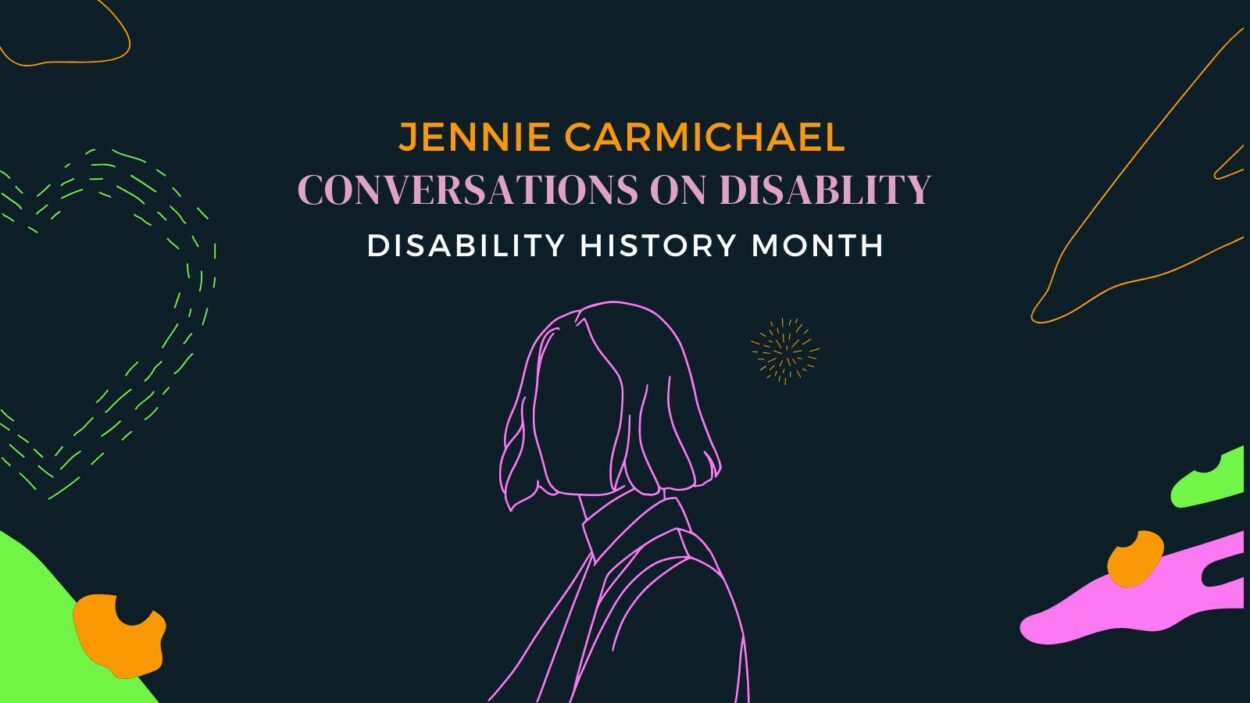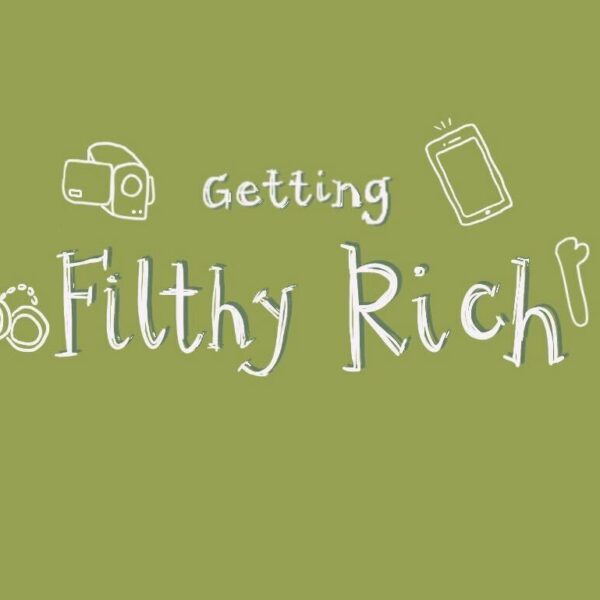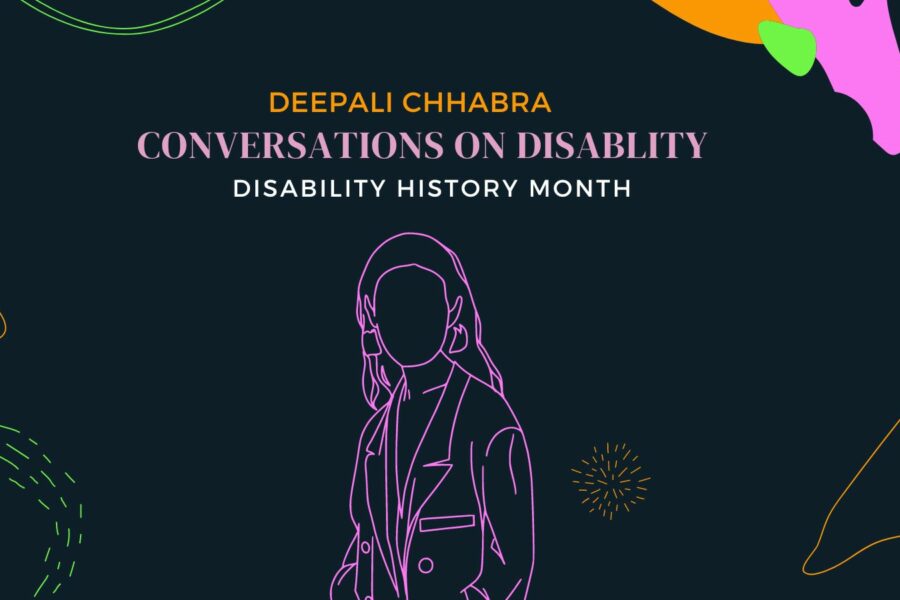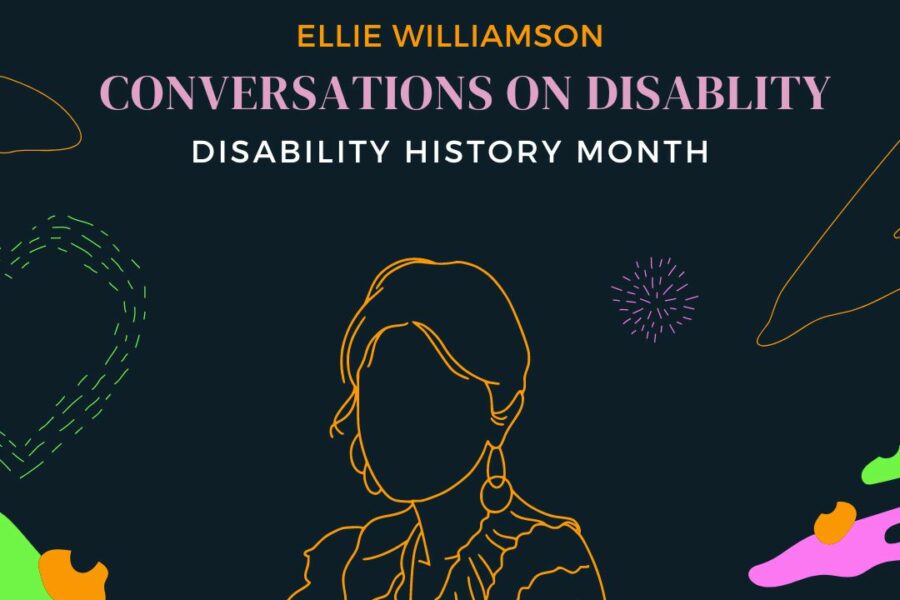Speaking to Jennie was electric and although she is only in her early twenties, her story demands to be written about. She is an academic, passionate woman who campaigns against ableism on her social media platforms – and I hope you enjoy reading this as much as I loved speaking to her.

Conversations on Disability with Jennie Carmichael
By this point in the series, I was already seeing my disability for what it is, not what I had internally made it out to be. The previous conversation with Ellie injected me with a confidence to look a little harder and consider what it would be like if I was born with MS. Enter Jennie Carmichael. Jennie was born with hip dysplasia, and due to a late discovery, she has confronted many health complications, surgeries and was in a wheelchair for a significant period of her formative years. Speaking to Jennie was electric and although she is only in her early twenties, her story demands to be written about. She is an academic, passionate woman who campaigns against ableism on her social media platforms – and I hope you enjoy reading this as much as I loved speaking to her.
Firstly, what is hip dysplasia?
“… basically when I was born my hip socket wasn’t formed properly. Usually, I would show people using my hands but your pelvis is meant to cover your hip joint but mine didn’t – so it could potentially dislocate a lot. It is not life-threatening and I haven’t got much memory of the early years but I do remember my first surgery. It wasn’t discovered in me till I was 8 months old and I had it in both hips. It is more common on the left- side and when I was eventually put into a cast it fixed my right hip but not the left … it is hereditary, and my cousins kid has it and she was put in the brace and now she is absolutely fine … it’s interesting because a couple years England and Wales NHS issued an apology because they missed so many cases of hip dysplasia. It was around the time I was born so I wouldn’t be surprised if my situation isn’t unique”
In the lead up to this call, I tried to have days of research – like the kind of movie scenes where the genius protagonist locks themselves away to find the answer to an impossible problem. Luckily, I allowed myself this time because there is a lot of information, personal blogs and suspicious holistic therapies surrounding hip dysplasia. Strangely this was the first I had ever heard of it but if you are curious to read more, this is the most informative page I can propose.
Are there times when having hip dysplasia made you feel isolated?
“so, yes, definitely I have felt lonely at times when I was not sure what was going on. In the beginning it was because I had surgeries when I was 7 and had to take time off school … when I returned I felt like a shiny new toy because I was in a wheelchair .. it got even lonelier than that just because I was missing out on things …. I have a key memory of 2010 and it was really snowy and I had just had a surgery and people had come to asked my brother to go out and sledge and I couldn’t go.. But in primary it was normal for them, they were kids and used to seeing it and it is not as ‘weird’. it’s part of their socialisation”
“But in high school and especially doing PE people thought I was lying, but why would I do that? I couldn’t sit on the ground, well I could but it would hurt, so I felt really singled out having to stand while all the other kids are down”
By this point I had interrupted and tried to make some comforting comments on how kids do not bite their tongue and can be dangerously honest. However, I had really started brewing over the differences between our experiences, given that she was born with hip dysplasia and that this PE session alone marks her disability as visible. The image of her standing and surrounded by kids is not far from how disabilities can make you feel and this instance acts out to be a playground shorthand for discrimination. She continues…
‘ I didn’t class myself as disabled until I was a lot older because I didn’t realise I was .. my parents would say to me ‘well I guess you are’… Then I had a surgery when I was 17 and that was the first time anyone at high school had understood that I have something wrong with me. It was a major surgery and there were only two doctors in Scotland that could do it …
It was pretty rough and the build up was confusing. No one at school really understood that this was a big major surgery and people compared it to tooth surgery … so me being 17 I convinced myself it was all going to go wrong and I wasn’t going to wake up”
Following the surgery in Glasgow, she was in this painful push and pull of being disappointed by friends that falsely promised they would visit her. She comments on how friendships were “obviously so important, and the night times felt really long” and this is when the loneliness would saturate her. This is something all people can sympathise with whether they are able, disabled or even Dolly Parton – but there is something about not being able to take agency over your physical actions I braced myself to read personal blogs on how people feel a sense of existential futility and a distinct anger at ‘what’ they had become, not who. This ‘what’ chimes throughout Jennies story when she comments on how differently she was treated in her wheelchair.
“The wheelchair was a gamechanger, once I was in the chair I didn’t feel like I was seen as a person anymore. I was dehumanised but they had known me for years. It was actually a wake up call for me and how subconscious ableism works. I felt like a burden … I wasn’t a person; I was a wheelchair … I would ask my friends to wheel me around a bit because I felt embarrassed, but I remember thinking this is so humiliating but I needed it!. It really formed my identity and it was really powerful turning point”
What are the reactions you get now?
“But you don’t look very disabled. What a strange thing to say. Even worse, some people would say ‘you shouldn’t say that to people’. Or, they think I am joking and being ableist! … Some however are willing to learn and want to hear about it.“
We chat on about why it makes people so uncomfortable and laugh a lot about people that seize up when someone disabled heads towards the stairs. In hindsight, she was surrounded by some strong ableist language which is still part of the colloquial language today, from a casual retard to the more callous words like invalid and witch. It has taught us both invaluable lessons on ableism and she came to realise that…
“I am disabled and that’s ok. I was pushed her to feel more empowered and say to people that I am disabled. I would never have said it before … maybe I was channelling anger at the way I had been treated but it has given me respect for people with more visible disabilities or symptoms that makes their life harder than my own”
Heading toward the end of our conversation, we discussed the spirit behind actively discussing disabilities to normalise them. Jennie encourages this discourse about ableism to articulate that something which now empowers her, was once debilitating because our society is not suitable for all. Here is where I closed the curtains on our conversation, but it has left me, and maybe you, thinking about how it is not just our physical surroundings that can be so intensely isolating for someone in a wheelchair. Our echo chambers may ring with cries for inclusivity but just isn’t translated into the reality for everyone and maybe disabled communities have slipped under the ‘woke’ radar. For the final article I am going back to the cinematic state and researching the harms of our subconscious bias. Once again, I really hope you enjoyed reading and lock yourselves in for the final installation! xxx






Leave a Comment